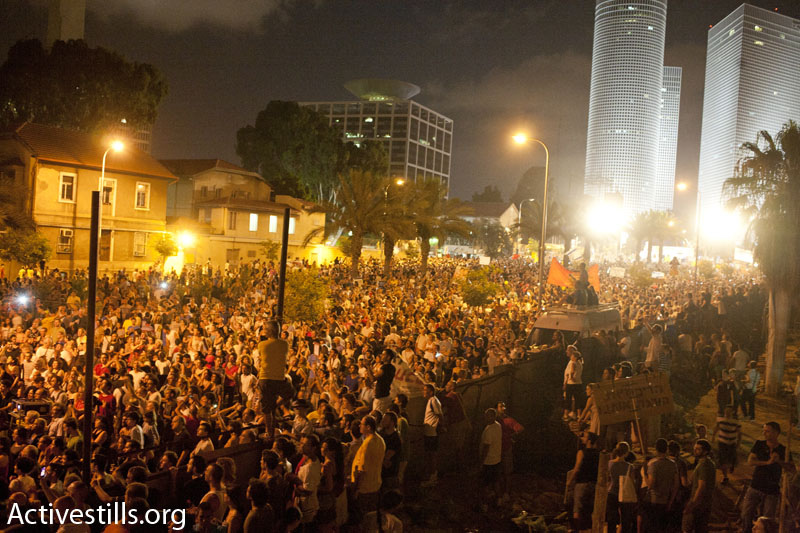Did you see Robin Margo's op-ed in yesterday's Sydney Morning Herald?
Now is the time to be involved in NIF Australia and to support this movement of Israelis. Like NIF Australia on Facebook, tell your friends to subscribe to our updates, and consider donating and supporting this important cause.
Shabbat shalom,
The New Israel Fund Australia team.
Tent city is a beacon of social justice and optimism for all Israelis Imagine Martin Place and Hyde Park transformed into a tent city and Oxford Street impassable by vehicles as hundreds of thousands of Australians unroll swags and stage a mass sit-in that spurs copycat protests at Federation Square in Melbourne and Southbank in Brisbane.
Imagine Martin Place and Hyde Park transformed into a tent city and Oxford Street impassable by vehicles as hundreds of thousands of Australians unroll swags and stage a mass sit-in that spurs copycat protests at Federation Square in Melbourne and Southbank in Brisbane.
It may be hard to imagine tent cities sprouting across this country but that's been Israel's reality for almost a month as a critical mass of protesters have set up camps in Tel Aviv's city centre and elsewhere, refusing to leave until the Prime Minister, Benjamin Netanyahu, acts on their grievances.
No, they're not up in arms over continued rejectionism by Hamas extremists, or the nuclear ambitions of Iran's ayatollahs, or where a UN vote over Palestine might lead.
Their main complaint is something Sydneysiders know about: the unaffordability of housing and the spiralling cost of living.
Property prices have risen about 50 per cent since 2008 as Israel's burgeoning population - more than 7 million people squeezed into a slither of land about a third the size of Tasmania - vastly outstrips construction.
The so-called ''tent revolution'' has also morphed into a wider protest about the disintegration of communal solidarity and the welfare state.
But this is not Israel's equivalent of the ''Arab Spring''. Rothschild Boulevard - a leafy, European-style inner-city thoroughfare where one young woman put up a tent on July 14 in protest against her exorbitant rent - is not Tahrir Square. There is no violence, no looting, no thuggery. The protesters are not armed with guns or stones; they bear banners with slogan such as ''the people demand social justice'' and ''the people will take back the country''.
This has not led to violent clashes with police, let alone government-backed armies mowing down civilians like in Syria, Tunisia or Libya. Nor has it led to urban anarchy, as has happened in Britain.
In short, this is the Jewish state's democratic pulse beating as it has since the day it was born. For popular protests are a sine qua non of Israeli society - virtually every week there's a protest from a different sector of society. And the demonstrations are almost always non-violent, with some exceptions, most notably the assassination of the Prime Minister Yitzhak Rabin in 1995.
What is different about the tent demonstration is its inclusiveness, size and the speed with which it spread, peaking when an estimated 300,000 demonstrators in Tel Aviv protested in what's believed to have been the biggest socio-economic demonstration in Israel's history.
On the surface, the tent revolution is apolitical, almost anti-political, not about the broader political questions that have led to a tragic breakdown of the peace process.
But there are political connections. Average Israelis who work within the Green line and pay taxes are fed up watching much of their nation's budget being squandered on a settlement enterprise in the territories that has fanned fanaticism among some Israelis and nihilism among some of their enemies. They know the enterprise has blossomed because of discounted housing and other subsidies offered by successive governments, tempting many non-ideological Israelis to become ensnared in the delusion of ''greater Israel''.
They complain that Israel, a nation founded by socialist pioneers, is losing its social moorings in a tide of capitalism and privatisation that has swept through the country over nearly two decades.
Though unemployment is low and the economy strong, there's a gaping chasm between rich and poor: one in four people in Israel, and one in three children, live below the poverty line.
According to the OECD, which recently granted Israel membership, the rich-poor gap in Israel was one of the largest in the world in 2010.
As Amos Oz, one of Israel's leading intellectuals, wrote on a visit to Australia this month: ''The heart of this protest is the affront and outrage over the government's indifference to the people's suffering … and the destruction of social solidarity.''
A major player in these events is the New Israel Fund which, with organisations it funded, is widely acknowledged as the bulwark of Israel's civil society.
The fund alone could not have created such a widespread grassroots protest but it brought these issues to attention years ago and it will continue to carry the torch when the tent-dwellers finally pack up.
In 2009, the fund was instrumental in creating a Coalition for Affordable Housing. And now the protesters have forced the government to confront that crisis. The fund has been strengthening Israeli civil society for more than three decades, giving voice and muscle to those on the margins, defending the rights of women, Ethiopian Jews, Jews from Arab countries, Israeli Arabs, Bedouin and Druze, and promoting religious pluralism and social justice for all Israelis.
And ultimately it is social justice for all Israelis - irrespective of religion, race or gender - that hundreds of thousands of people camped in tent cities across Israel are demanding.
These events are thus grounds for optimism. Israel may be a democracy in distress as multiple factions struggle for its soul, but the tent protesters represent a new coalition that transcends factional politics, religion and class.



